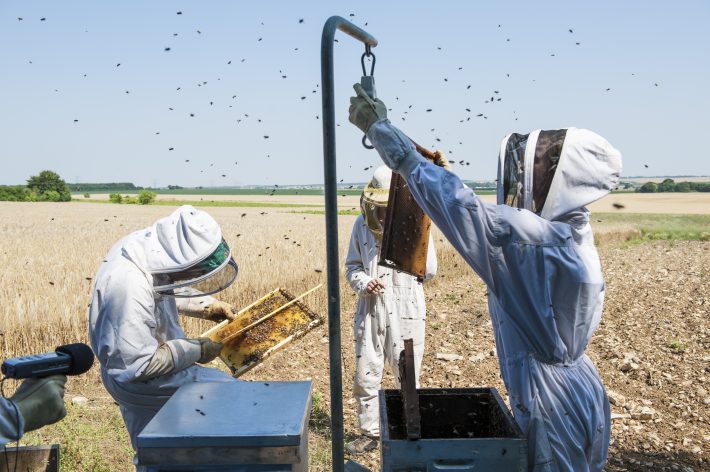Organic farming improves honeybee colony performance in a crucial flower-scarce period
The French National Institute for Agricultural Research (INRA) and The French National Center for Scientific Research (CNRS) press release
Organic farming benefits honeybee colonies, especially during flower-scarce periods. This study was published today in the Journal of Applied Ecology.

Researchers of the French national research institutes INRA and CNRS are the first to show that organic farming benefits honeybee colonies.
The research team analysed six years of data collected through the unique honeybee monitoring scheme ECOBEE, and determined that organic farming benefits honeybee colonies particularly during the flower-scarce period between the blooms of rapeseed and sunflower.
In the last decade, beekeepers have noticed poorly developing honeybee colonies and experienced high loss rates. Intensive agriculture, characterised through high inputs of agrochemicals and abundant monocultures, has been viewed as a major driver of this decline.
Organic farming is viewed as a more ecological alternative but effects on honeybee colony performance were not yet assessed despite the enormous importance of honeybees.
Honeybees are not only relevant to humans as honey producers but also as pollinators of wild flowers and crops.
Bees feed exclusively on nectar and pollen. Therefore, honeybees suffer from the low flower availability in May and June between the blooming periods of rapeseed and sunflower as is typical in highly intensive farming landscapes.
In this period, pollen collection, honey production and colony growth decline.
A study published in Journal of Applied Ecology shows now that organic farming can mitigate this decline, possibly through a higher availability of melliferous weeds, cover crops and hedges.
Dimitry Wintermantel, who conducted the study as part of his PhD, said:
“Although we expected that organic farming benefits honeybee colonies particularly in this flower-scarce period, we were surprised about the magnitude of the positive effects.”
The researchers found up to 37% more worker brood, 20% more adult bees and 53% more honey in colonies exposed to organic farmland as compared to colonies in conventional agricultural landscapes in this particular study site (Nouvelle Aquitaine Region, south-West France).
Worker brood production and number of adults benefited, however, mostly from organic farmland at the local scale (300 m from the hives), while honey reserves benefited from organic farmland at the landscape scale (1500 m from the hives).
This suggests that organic farming may act on the colony traits through different mechanisms.
Increased worker brood production that translates into increased number of adults may be due to more diverse pollen resource and decreased pesticide drift at the local scale.
Honeybee reserves may increase from an increased availability of melliferous flowers at the larger scale which corresponds to the mean foraging distance of honeybees.
This study was possible due to the unique honeybee colony monitoring scheme ECOBEE that was initiated by INRA le Magneraud and the Centre d’Etudes Biolgiques de Chizé in 2008.
To measure effects of farming practices under real-world conditions, 50 experimental colonies are placed each year at 10 different randomly selected spots in the Long-Term Socio-Ecological Research site ‘Zone Atelier Plaine & Val de Sèvre’ in western France.
Although only data collected after 2011 were included to avoid drawing conclusions from years with little amounts of organic farmland, the researchers had an exceptionally large dataset available.
Jean-François Odoux who coordinates the ECOBEE scheme. explains:
“To our knowledge, no other honeybee monitoring scheme has run over such a long time and at such a large scale with 50 colonies per year.”
The new study suggests that organic farming can mitigate negative effects of intensive farming and increase honeybee colony survival. Previous research by the same team showed that declined worker brood production in the flower-scarce period leads to decreased colony winter survival.
The increase of worker brood production associated with organic farmland in this period may therefore enhance long-term survival of a crucial pollinator with possible implications for the wider landscape.
Vincent Bretagnolle, the project leader, explains: “Organic farms and fields are often seen by conventional farmers as a source for pests; we show here that organic farming has actually positive effects at the landscape scale, not only for biodiversity in general, but for beekeepers as well and even for conventional farmers since honeybees contribute to rapeseed and sunflower yields”.
Read full study (free to read for a limited time):
Wintermantel, D, Odoux, J-F, Chadœuf, J, Bretagnolle, V. Organic farming positively affects honeybee colonies in a flower-poor period in agricultural landscapes. J Appl Ecol 2019. DOI: 10.1111/1365-2664.13447
Media contacts:
Armelle Perennes, INRA, Email:armelle.perennes@inra.fr
Press office, CNRS, Email: presse@cnrs.fr
Like what we stand for?
Support our mission and help develop the next generation of ecologists by donating to the British Ecological Society.